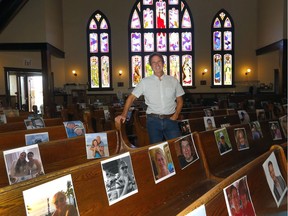Opinion: The good news and the bad news of a pandemic

Article content
A person on a Zoom call asked me recently, “What’s the hardest thing and the best thing about being a minister of a church during COVID-19?”
I had to pause because I realized it is a “both and” answer. There is both good news and bad news to this pandemic.
The obvious bad news is the illness, loss, and stresses that many are facing. This is hard for everyone.
For me, this is the hardest I have had to work in 30 years. It is unknown space. It is a different way of working.
The hardest reality of this pandemic for a church is the end of in-person gatherings. This is the right thing to do. Safety first.
The church by definition is the gathering of people. In these gatherings people meet friends, neighbours and strangers in conversation. People share the good news of their life, a recent wedding, a good golf game, the birth of a grandchild or even the sighting of an animal in nature.
Similarly, people share news of a recent loss, the concern about medical tests, or the worry about the state of the world. Church is a place of conversation and of exchange. It is a meeting place.
These days, we miss each other but surprisingly our connection didn’t lapse. Though we are physically disconnected, we are even more emotionally connected.
Funnily, people are surprised that they can actually connect with others via computer. During this pandemic we have held online services, weddings, funerals, baptisms, book clubs and town hall meetings with record attendance.
We have lived our values of hospitality, spirituality, social justice and risk even more boldly. It is amazing to watch how people adapt and continue on. Our online church attendance has tripled and our congregation is now global. How strange is that? Adapting to new situations leads to growth.
The second awareness is that the church is now literally without walls and that means we have a deeper connection to the world around us. We realize that the community experience is beyond an hour a week. The church got legs.
Now we are aware that the call to be a neighbour has been expanded beyond those who gather in a building. Literally, this is practiced by wearing a mask, keeping apart and respecting other people’s space.
There is an honouring of another in these practices. Theologically it is expanding the universal call to love one’s neighbour.
This practice of apartness is contrary to how we might have defined community or responsibility and yet it is living the call to love a neighbour regardless of religious or non-religious perspective. It is practicing the phrase, “We are all in this together.”
The person who wrote the book of Hebrews in the Bible says, “Practice hospitality, for in doing so you may be entertaining angels unawares.” Indeed, practicing the pandemic protocol is being an angel, or messenger, to friends and strangers alike.
Thirdly, I have also learned a new word, liminal. It is Latin word for “threshold.” In the ancient world, it was literally a rock stepping stone between two worlds. We are living in liminal space. We have left the old way of living pre-COVID and we have not stepped into the new world or post-COVID.
Standing on a threshold is not always comfortable. It is can be anxious, fearful or worrisome. It can also be exciting, curious and hopeful. We aren’t going back to “what was” as individuals or as communities when a vaccine comes. I believe all families, workplaces, and communities will be rethinking how they live in the new world.
This liminal space is a time to explore what we want to take to the “new world.” What will we let go of and leave behind? What will we innovate or create anew, as we step forward? This is adaptive space. It requires flexibility and openness to possibility.
The pandemic has sadly revealed some of our communal shortfalls like our care of seniors and the vulnerable; our systemic racial injustice; and, the limits in our health care system. It has heightened our awareness of the weaknesses and strengths in our political systems. There is much to address.
This time has also shown our resilience, creativity and desire for deeper connections. This is a time of important learning on the threshold. This is the good news of being a minister in these days, reimagining the future with others.
This pandemic has brought an urgency to our lives and organizations. It was needed. It was a wake-up call. I believe we are all reflecting on what matters most. Liminal space requires patience, on the threshold, as we imagine and prepare a better future for everyone.
This liminal space is gift. It will require deep listening, deep conversation and creative reimagining of the society we all yearn to live in. For me this is good news.
John Pentland is lead minister at Hillhurst United Church in Calgary.






Postmedia is committed to maintaining a lively but civil forum for discussion. Please keep comments relevant and respectful. Comments may take up to an hour to appear on the site. You will receive an email if there is a reply to your comment, an update to a thread you follow or if a user you follow comments. Visit our Community Guidelines for more information.